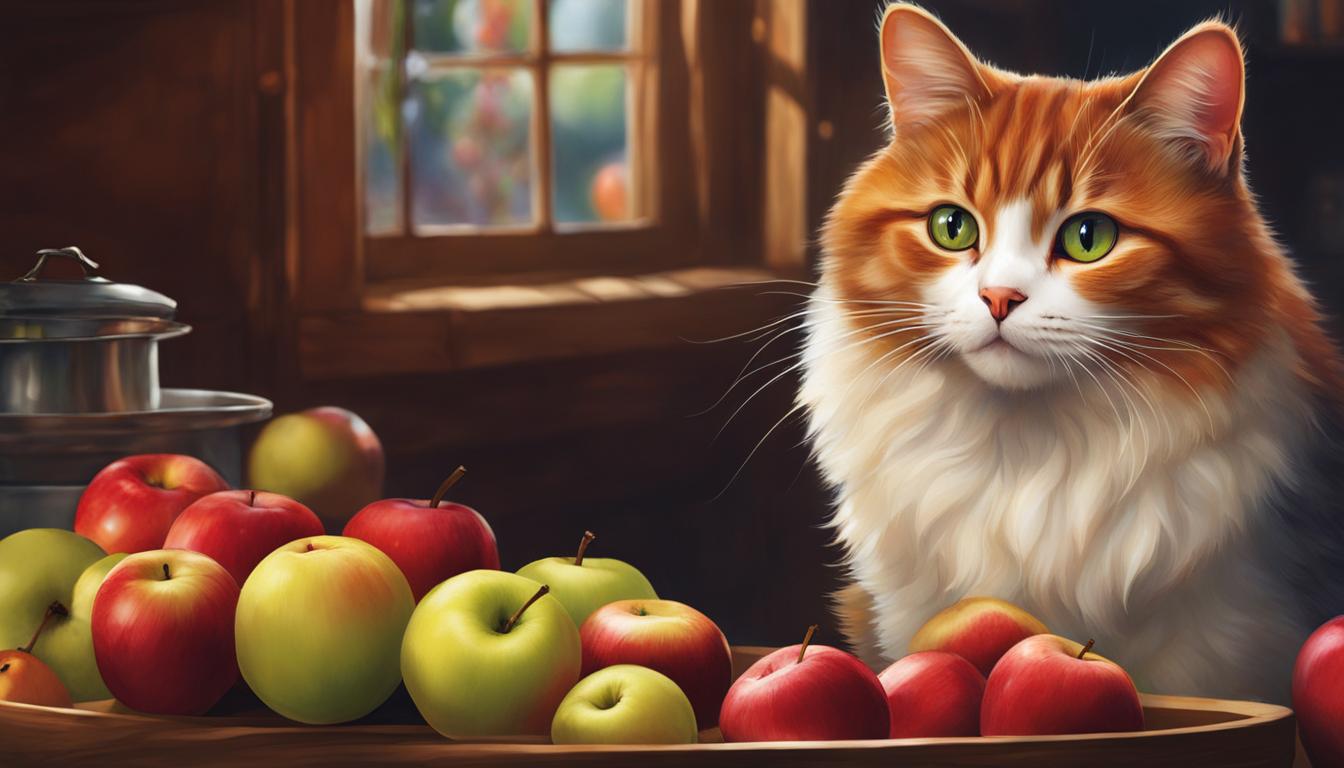Curious about whether cats can eat apples? Wondering if apples are safe for your feline friend? In this article, we’ll explore the topic of cats and apples to help you make informed decisions about your pet’s diet.
Risks and Precautions with Feeding Cats Apples
While apples are generally safe for cats, it is important to be aware of certain risks and take precautions when feeding them to your furry friend. Here are some things to keep in mind:
Potential Risks
- Apple leaves, stems, and seeds contain cyanide, which is toxic to cats. It is crucial to prevent cats from ingesting these parts of the fruit.
- Apple seeds, in particular, can be dangerous for cats, as they contain a small amount of cyanide that can be harmful to their smaller size.
- Cats with obesity, diabetes, or gastrointestinal issues may not tolerate apples well due to the high sugar and fiber content.
To ensure the safety of your cat, it is important to monitor them for any adverse reactions when introducing new foods like apples into their diet. Look out for symptoms such as diarrhea or vomiting, and consult your veterinarian if you notice any concerning signs.
Precautions
If you decide to give your cat apples, it is essential to follow these precautions:
- Remove the leaves, stems, and seeds from the apple before offering it to your cat.
- Only give your cat a small amount of apple as an occasional treat, making sure it doesn’t exceed 10% of their daily calorie intake.
- Observe your cat’s reaction to the apple and discontinue feeding it if any adverse effects occur.
Remember, while apples can provide some nutritional benefits, they should not replace your cat’s regular diet, which should consist of specially formulated cat food that meets all their nutritional requirements.
| Risks | Precautions |
|---|---|
| Apple leaves, stems, and seeds contain cyanide | Remove the leaves, stems, and seeds before offering apples to your cat |
| Apple seeds contain cyanide | Avoid giving your cat apple seeds |
| Cats with obesity, diabetes, or gastrointestinal issues may not tolerate apples well | Monitor your cat for any adverse reactions and consult a veterinarian if needed |
By being aware of these risks and taking necessary precautions, you can safely introduce apples into your cat’s diet, ensuring their well-being and enjoyment of an occasional fruity treat.
Alternatives to Apples for Cats
While apples can be given to cats in moderation, there are alternative fruits that may be more suitable for feline consumption. If you’re looking to introduce some variety into your cat’s diet, here are a few cat-friendly fruits to consider:
Bananas: Cats can enjoy small slices of ripe banana as an occasional treat. Bananas are a good source of potassium and can provide a sweet and tasty snack for your feline friend.
Strawberries and Blueberries: These berries are safe for cats and can offer a burst of antioxidants. Just make sure to remove any stems or leaves and give them to your cat in small, bite-sized pieces.
Cantaloupe: Cats can enjoy a small amount of ripe cantaloupe, but remember to remove the seeds and rind. Cantaloupe is a refreshing fruit that can help keep your cat hydrated on hot days.
Cucumbers: Cats can munch on cucumber slices as a low-calorie and hydrating snack. Cucumbers are a great source of water and can be a refreshing treat for your furry friend.
Remember, fruits should only be given to cats in moderation and should not replace their regular cat food. It’s always a good idea to consult with your veterinarian before introducing any new foods into your cat’s diet to ensure they are safe and appropriate for their individual needs.
FAQ
Can cats eat apples?
Yes, apples are generally safe for cats to eat in moderate amounts.
Are apples nutritious for cats?
While cats are obligate carnivores and do not require fruits and vegetables for their nutritional needs, apples can provide some minerals, vitamins, dietary fiber, and antioxidants.
Can cats digest apples as effectively as humans?
Cats may not be able to digest and absorb the nutrients in apples as effectively as humans.
Do cats like the taste of apples?
Cats usually lack taste receptors for sweetness, so they are not typically very interested in the taste of apples.
Are there any risks associated with cats eating apples?
Apple leaves, stems, and seeds contain cyanide, which is toxic to cats. It is important to prevent cats from ingesting these parts of the fruit. Apple seeds, in particular, can be dangerous due to the small amount of cyanide they contain. Cats with obesity, diabetes, or gastrointestinal issues may not tolerate apples well due to the high sugar and fiber content.
How should apples be introduced into a cat’s diet?
Apples should only be given as an occasional treat and should not make up more than 10% of a cat’s daily calorie intake. It is crucial to monitor cats for any adverse reactions, such as diarrhea or vomiting, when introducing new foods like apples into their diet.
What are some alternative fruits for cats?
Cat-friendly fruits include bananas, strawberries, blueberries, cantaloupe, and cucumbers. These fruits can provide some nutritional benefits and hydration for cats.
Should fruits replace a cat’s regular diet?
No, fruits should not replace a cat’s regular diet. Specially formulated cat food that meets all their nutritional requirements should be the primary source of their diet.
Is it necessary to consult a veterinarian before feeding cats fruits?
It is always recommended to consult with a veterinarian before introducing any new foods into a cat’s diet to ensure they are safe and appropriate for their individual needs.
